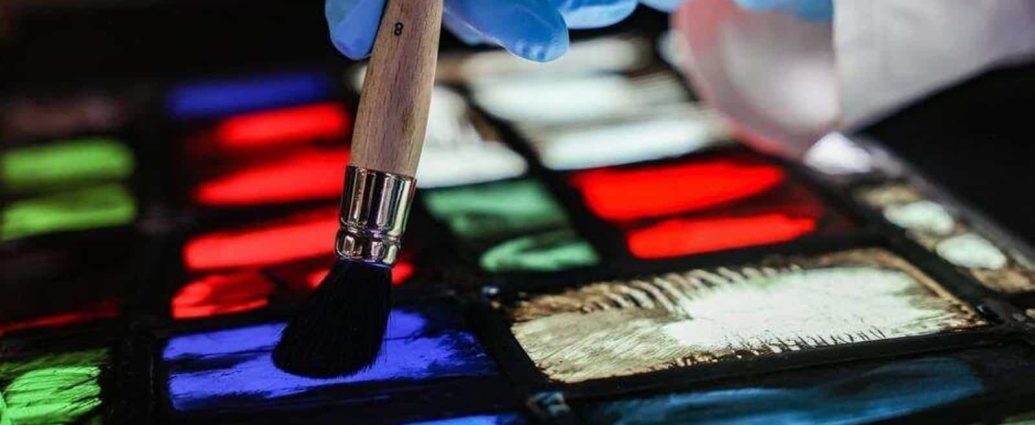Matthias Deml, an art historian and spokesman for the Cologne Cathedral Builders Works, remembers the evening of April 15, 2019, well. “I sat in front of the TV, shocked and stunned,” he says. Meter-high flames burst from the roof of the world-famous Notre Dame Gothic cathedral in Paris.
The fire destroyed the wooden roof truss made of 1,300 oak beams, dubbed “la foret,” or the forest. The heat melted the roof made of 250 tons of lead. The wooden crossing tower collapsed. It was not until a day later that the fire department was able to extinguish the fire. To this day, no one knows what started it — perhaps it was a short circuit, perhaps a discarded cigarette butt.
Four years later, Deml’s colleagues Katrin Wittstadt and Elodie Schneider are working on a window by Jacques Le Chevallier, a 20th-century stained glass artist. “The biggest problem is contamination from a thick layer of lead dust,” says Wittstadt, the scientific director of the glass workshop at Cologne Cathedral’s Builders’ Works and in charge of the restoration of four Notre Dame windows.
Iconic rose windows in good shape
Dirt, smoke and water used by the firefighters caused great damage to the interior of the church. Fortunately, many precious relics and treasures were salvaged, and numerous works of art were merely soiled.
(Also Read | Notre Dame Cathedral’s organ getting 4-year-long cleaning)
The flames spared the Gothic cathedral’s world-famous rose windows, but some 19th and 20th century windows were damaged, including the four Le Chevallier clerestory windows in the nave of the church. Unlike many other of the cathedral’s windows, these multi-coloured stained-glass windows are non-figurative.
For the most part, the 300 individual panes remained undamaged. Only individual bits need to be replaced or repainted. “This pane is shattered into many small pieces and our job is to complete it with a matching coloured glass,” the restorer says, pointing out an area of cracked glass.
Restoration work soon complete
Cleaning and repair work could have taken place on site in Paris but the damage to the church vault was so great that the windows had to be removed. In November, a truck brought them to Cologne for the restoration work, which should be done by spring. The experts first documented the damage before cleaning the windows in a decontamination chamber, gluing cracks, replacing broken pieces and repainting. The final step: Soldering the lead mesh and cementing the exterior.
France long debated whether or not to rebuild Notre Dame Cathedral as it was, or according to contemporary designs. Renovation and restoration is estimated to take five years. Time is short because the church is scheduled to reopen next year on April 15, the fifth anniversary of the fire. Repairs are likely to continue even afterwards. The total budget for the reconstruction is about €830 million ($895 million), mostly from funds pledged and donated.
Symbol of France
French President Emmanuel Macron made the reconstruction of Notre Dame, a UNESCO World Heritage Site since 1991, a top priority early on. For many people in France, Notre Dame has great emotional significance. The cathedral has seen many an historical event including the coronation of Emperor Napoleon in 1804 and the funeral of former president Charles de Gaulle. The bells of Notre Dame would ring out on important occasions, including to celebrate liberation from the Nazis in 1944. The 1956 film, “The Hunchback of Notre Dame,” based on a novel by Victor Hugo, also boosted the cathedral’s fame.
The 130-meter-long (427 feet) medieval Catholic church was built on the Seine island of Ile de la Cite, in the heart of Paris. Construction began in the 12th century, and today its two 69-meter-high main towers soar over the rooftops of Paris. The view is magnificent. Up until the devastating fire in April 2019, up to 14 million people visited Notre Dame every year. It was the most visited site in France, even ahead of the Eiffel Tower, the Louvre and the Arc de Triomphe.
Close ties between the Builders’ Works
If there is such a thing as a cathedral friendship, then it is would be between Notre Dame de Paris and Cologne Cathedral. Today, both are landmarks in their own cities.
“Our cathedral is very strongly influenced by the French Gothic style,” says Matthias Deml. The Builders’ Works are connected. The cathedral builders, organized in the Association of European Cathedral Builders, meet regularly for conferences.
“It is a great honor that we are allowed to work on Notre Dame,” says Deml.
